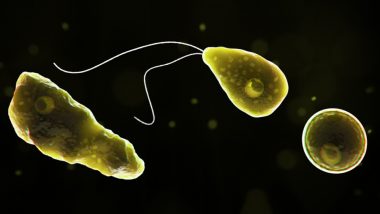Florida, July 6: A rare case of brain-eating amoeba has been confirmed in Hillsborough County in the US state of Florida. The department of health, in a statement on July 4, said one person had contracted Naegleria fowleri - a microscopic single-celled living amoeba that "destroys the brain tissue and is usually fatal". The health department warned residents about Naegleria fowleri and urged them to avoid nasal contact with warm water. US: Florida Hits More Than 200,000 Coronavirus Cases.
Commonly found in warm freshwaters such as lakes, rivers, hot springs, water heaters and swimming pools that are not properly chlorinated, Naegleria fowleri enters the body through the nose. While the brain-eating amoeba is rare in Florida, given the high mortality rate due to its infection, the Florida health department issued a warning to residents of Hillsborough County. The state of Florida has only reported 37 cases since 1962. Its peak season in Florida is in July, August and September. US House Speaker Tests Positive for Coronavirus.
Hillsborough County Health Department Confirms Rare Case of Naegleria Fowleri Infection:
One person contracted Naegleria fowleri in Hillsborough County. Naegleria fowleri is a microscopic single-celled living amoeba. The amoeba can cause a rare infection of the brain called primary amebic meningoencephalitis (PAM) that destroys brain tissue and is usually fatal. pic.twitter.com/icT66tqlkU
— DOH - Hillsborough (@DOHHillsborough) July 3, 2020
What is Naegleria fowleri, Brain-Eating Amoeba?
According to the Florida health department, Naegleria fowleri infection cannot be spread from person to person contact and will not occur as a result of drinking contaminated water. Although Naegleria fowleri is commonly found in the environment, infection occurs rarely. However, this disease has public health importance because of its high fatality rate. Only four persons out of 143 known infected individuals in the United States from 1962 to 2016 have survived.
Those infected with the brain-eating amoeba display symptoms including fever, nausea and vomiting, as well as a stiff neck and headaches. Most die within two weeks. Naegleria fowleri grows at temperatures of 115 degrees Fahrenheit. The only known way to prevent Naegleria fowleri infections is to refrain from water-related activities and avoid nasal contact with warm freshwater, hot springs, and thermally-polluted water.
(The above story first appeared on LatestLY on Jul 06, 2020 11:22 PM IST. For more news and updates on politics, world, sports, entertainment and lifestyle, log on to our website latestly.com).













 Quickly
Quickly


